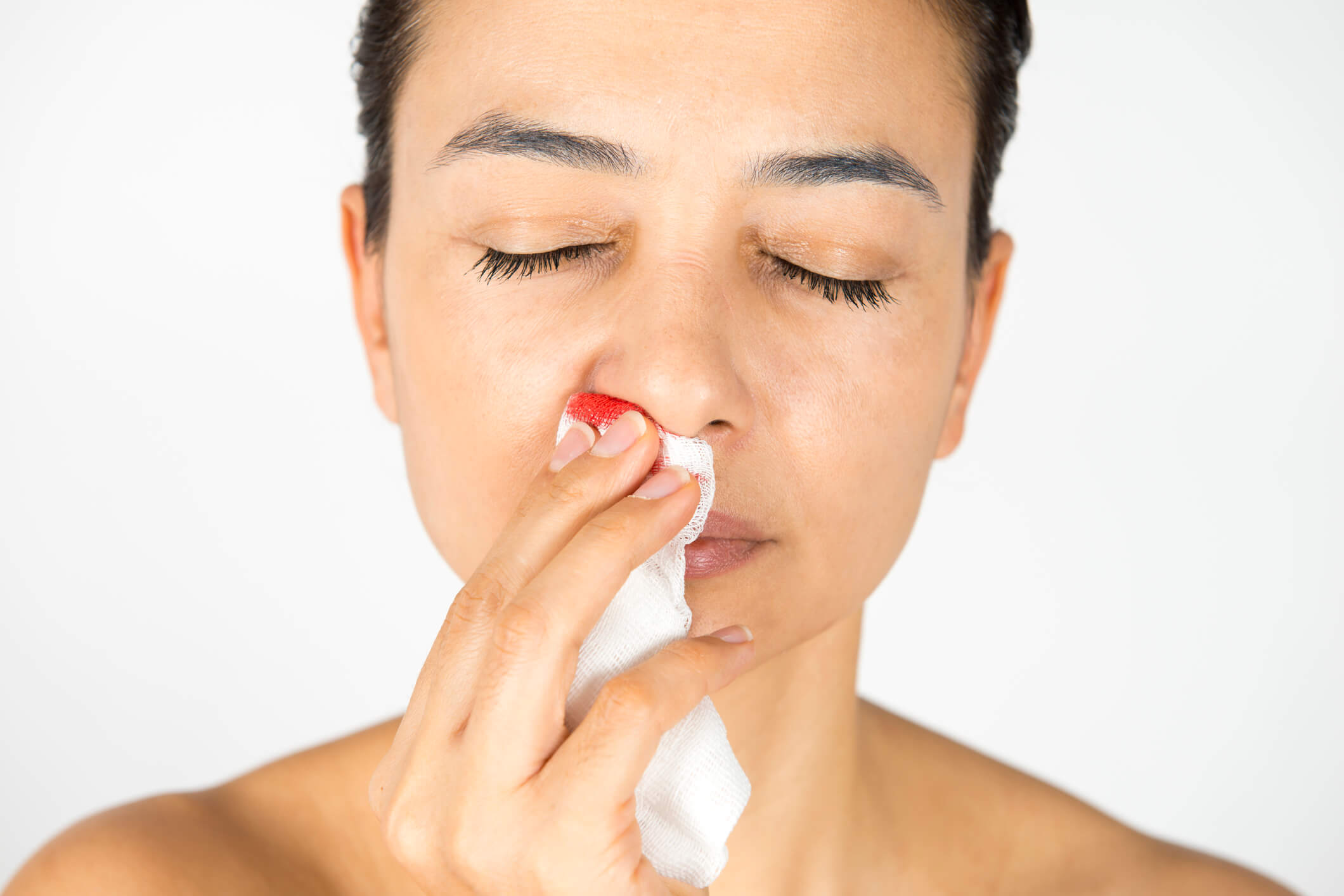Bloody Nose Vitamin C
Bloody Nose Vitamin C
 By Joy Stephenson-Laws, JD, Founder
By Joy Stephenson-Laws, JD, Founder
We've all been there - the dreaded nosebleed!
According to the American Academy of Otolaryngology–Head and Neck Surgery (AAO-HNS), one of every seven persons in the United States will develop a nosebleed some time in their lifetime. The Academy also reports that nosebleeds can occur at any age, but are more common in children (2-10 years) and adults (50-80 years).
Luckily, nosebleeds are usually not life-threatening. In fact, at times they seem to just happen out of nowhere.
Why Do You Have Nosebleeds?
To put it simply, your nose is a very delicate part of your body.
"The nose is very prone to bleeding. This is because of the important role it plays in warming and humidifying the air we breathe. Large numbers of small blood vessels lie just under a thin layer of skin , as a heat exchange mechanism for air going to the lungs," according to one extensive report on why we get nosebleeds.
"A number of things can cause those vessels to rupture and the nose to bleed."
What Are Some of These Things That May Cause A Nosebleed?
- Trauma . For example, a hit to the face. A nosebleed can occur whether your nose is fractured or not. Picking and scratching your nose may also cause it to bleed. So now you have another reason to tell your little ones to not pick their nose. It's not only unsanitary and can spread infection but can also make them bleed! A nose piercing may even increase the chances of a nosebleed.
- The Weather . Extreme climates, either very hot or cold, may increase your chance of having a nosebleed. Low humidity climates may also cause nasal dryness which can contribute to the likelihood of you having a nosebleed. Depending on where you live, you may want to consider having a humidifier in the bedroom when you sleep.
- Medication . Although we are not suggesting you stop taking any medication your doctor has instructed you to take, be aware that some medications may increase the chance of having a nosebleed. Anticoagulants (blood thinners) and nonsteroidal anti-inflammatory drugs , for example, may cause nosebleeds.
- Drug Abuse . Cocaine abuse is obviously bad for you for so many reasons, and it most definitely may cause your nose to bleed.
Having certain medical conditions may cause nosebleeds as well. Hemophilia (a disorder in which blood doesn't clot normally) may cause them. Liver disease , kidney disease and having high blood pressure may also increase the risk. "Rarer causes include local cancers and leukaemia," according to the extensive report. But if you are overall healthy and have not been in a major accident, your nosebleed is likely nothing life-threatening.
A Nosebleed is Not Just a Nosebleed. There Are Two Specific Types.
"Depending on the location of the ruptured blood vessels, the bleed is classified as anterior (the front part of the nose) or posterior (the back part of the nose)," the report says.
"The blood from an anterior bleed will predominantly flow out of the nostrils, while with a posterior bleed, much of the blood will end up in the throat to be spat up or swallowed...Bleeding from the back of the nose, while less common overall , is more likely to occur in older people. It's also likely to be more difficult to control and may continue for many hours."
Nutrients & Nosebleeds
If someone suffering from a nosebleed ends up bleeding for a prolonged period of time, this loss of blood could cause a significant loss of iron, which in turn, may cause anemia. This condition is also more than just an iron deficiency . In the event of prolonged bleeding, a blood transfusion may be necessary. Keep in mind that a loss of blood may also decrease the amount of oxygen to the tissues .
And because nasal infections may cause nosebleeds, it is important to maintain a strong immune system to ward off bacteria and viruses that may cause illnesses. Eat plenty of fresh fruits and vegetables . Also drink plenty of water which is also important for immune function. Water will also help keep that delicate skin inside the nose hydrated and may help prevent nasal irritation and dryness.
Having too much of a certain nutrient may cause a nosebleed, and having too little of a particular nutrient may do the same.
Vitamin C is a powerhouse nutrient that may provide several benefits, including more rapid wound recovery , delayed aging , help with complications from diabetes and better immune function . However, too high of an intake of vitamin C may cause your nose to bleed.
" Avoid taking more than 2,000 milligrams of vitamin C in one day," according to one source . "Once you stop taking large doses, you could develop rebound scurvy , which makes you fatigued and irritable and can cause easy bruising, nosebleeds, dry hair and weight loss."
The National Institutes of Health (NIH) says that the amount of vitamin C you need on a daily basis actually depends on your age. They provide a chart with recommendations by gender and age group.
At the same token, a vitamin C deficiency may also cause nosebleeds. Some sources suggest you eat at least two pieces of fruit and three to four portions of vegetables daily in order to meet your vitamin C requirement. Fruits and veggies rich in vitamin C include bell peppers , asparagus , grapefruit , pomegranates and star fruit .
Vitamin K is another great nutrient to consider when trying to help nosebleeds. This nutrient plays an important role in coagulation , better known as blood clotting. Your body needs vitamin K in order to produce the proteins that go to work during the clotting process . The telltale sign of vitamin K deficiency is bleeding too much.
Also watch your alcohol and caffeine intake. Both of these can be dehydrating and exacerbate nasal dryness and irritation. Drinking too much alcohol also depletes critical vitamins and minerals you need to stay healthy overall.
Finally, spicy food is great, especially when it includes healthy spices like cayenne and cumin . But if you are having nosebleeds, lay off the spicy foods to see if you have any improvement. Spicy food can sometimes irritate the nasal passages.
Enjoy your healthy life!
The pH professional health care team includes recognized experts from a variety of health care and related disciplines, including physicians, attorneys, nutritionists, nurses and certified fitness instructors. This team also includes the members of the pH Medical Advisory Board, which constantly monitors all pH programs, products and services. To learn more about the pH Medical Advisory Board, click here.
Source: https://phlabs.com/prevent-nosebleeds#:~:text=Vitamin%20C%20is%20a%20powerhouse,cause%20your%20nose%20to%20bleed.

.png)

Tidak ada komentar